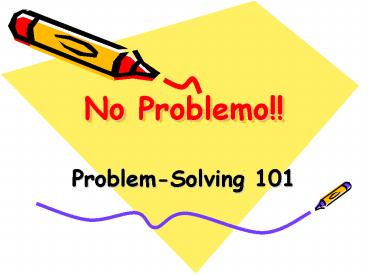No Problemo PowerPoint PPT Presentation
1 / 11
Title: No Problemo
1
No Problemo!!
- Problem-Solving 101
2
Problem-Solving
- A problem is a situation you want to change
either because something bad is happening or
because something good is not happening.
From Making Meetings Work by V.A. Howard and
J.H. Barton
3
The Problem-Solving Process
- Define the problem
- Generate and examine all alternatives.
- Choose a workable solution.
- Formulate a Plan of Action.
4
Poohs AppendixWinnie-the-PoohsProblem-SOLVE-in
g Checklist
- Select the Problem or Situation
- I selected It or It selected me
- Chosen to Improve
- Simple or Complex
- Single or Multiple
- Emotional associations (if yes, characterize) Y
or N - State the problem or situation as clearly and
simply as you can
5
Poohs AppendixWinnie-the-PoohsProblem-SOLVE-in
g Checklist
- Observe, Organize, and Define the Problem or
Situation - Starting place (any initial conditions,
resources, current status) - Goal (desired end result upon successful
completion) - Constraints (any limiting factors or obstacles)
6
Poohs AppendixWinnie-the-PoohsProblem-SOLVE-in
g Checklist
- Learn by Questioning All Parts of the Problem
- Why Solve It?
- What specifically is the problem?
- Where does the problem occur?
- Who is involved?
- How does it happen?
- Why is it a problem?
- Why does it occur there?
- Why does it occur then?
- Why are they involved?
- Why does it happen that way?
7
Poohs AppendixWinnie-the-PoohsProblem-SOLVE-in
g Checklist
- Visualize Possible Solutions, Select One, and
Refine It - Experience Have you ever had a similar
problem? How was that solved? - APPROACH
- Numerical Numbers
- Graphical pics, graphs, diagrams
- Logical logic, deduction, inference
- Analogy similar item, process, idea
- Intuitive gut feeling, hunch
- Other
8
Poohs AppendixWinnie-the-PoohsProblem-SOLVE-in
g Checklist
- Visualize (continued)
- Idea Generators Use to generate ideas without
qualifying or judging them. Take the problem or a
part of it and - Make it bigger Remove something
- Make it smaller Replace something with something
else - Add something Combine two elements
- Take something away Free association (say
anything and see what comes to mind) - Exchange two parts
- Choose best solution Now, be judgmental and
review all ideas for the best one, list pluses
and minuses for each, and feel free to combine,
or modify. - Refine and Improve Review the selected idea
carefully and improve or tweak.
9
Poohs AppendixWinnie-the-PoohsProblem-SOLVE-in
g Checklist
- Employ the Solution and Monitor Results
- Action Plan Create a path from here to there
list of all the things that need to be
accomplished or gathered in sequence with timing
and responsibilities noted. - Test on a small scale If applicable, try out
your solution a little at a time. - Employ and monitor Put solution in place, and
monitor criteria that will indicate success. - ! If at last, the solution does not work, take
heart you may have received a very large and
negative feedback, but you are still in the
process of solving just repeat all the above
steps using what you now know as additional
input.
10
Other Means of Problem Solving
- Creativity Oracle
- Many cultures have developed oracles to give
counsel to their members when making decisions.
Some examples include the Greek Delphic Oracle,
the Ancient Chinese I Ching, the Egyptian Tarot,
the Nordic Runes, and the North American Indian
Medicine Wheel. The purpose of these oracles was
not so much to foretell the future, as to enable
the user to delve deeper into his intuition when
dealing with a particular problem.
11
Creativity Oracle contd.
Most oracles consist of a system of messages from
which the user randomly selects one or more in a
specific pattern. The random selection is
important. Many people use the same
problem-solving approaches repeatedly, and as a
result, they come up with the same old answers. A
random message forces you to deal with the
problem in a way you probably wouldnt have
otherwise, and as a result, youre forced to look
at it in a different way.

